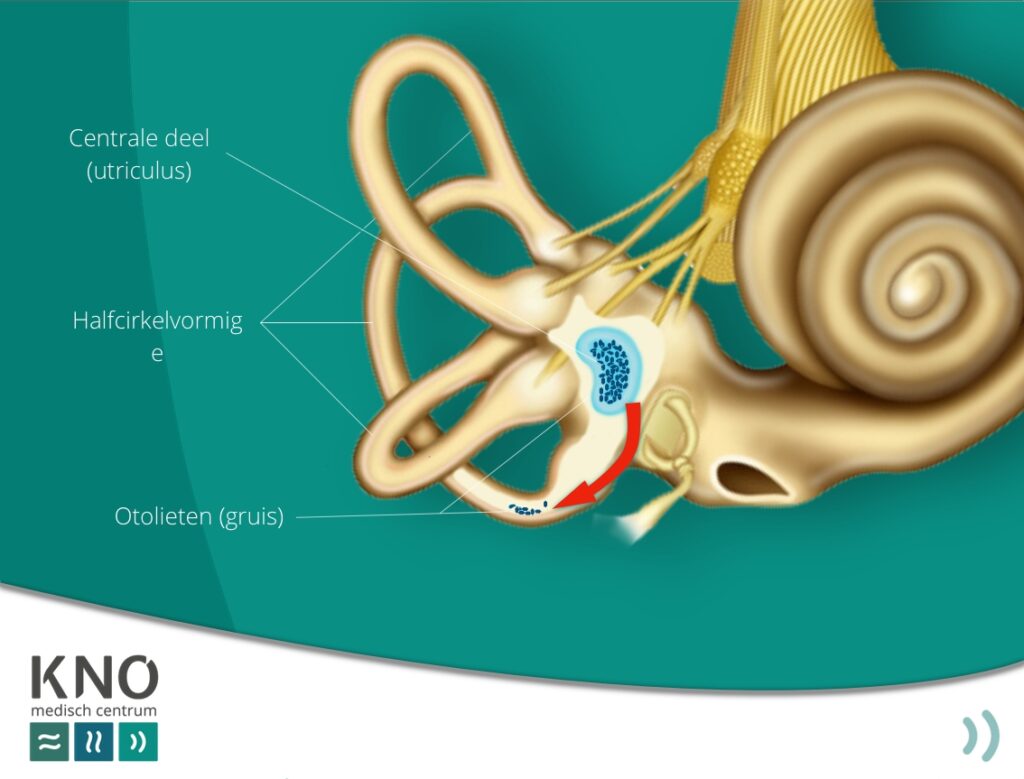what is BPPD?
explanation
Having BPPD (Benign Paroxysmal Position Dizziness) you will get attacks of dizziness when you move your head. This is caused by migrating stones (grit) that end up in the wrong place in the vestibular system. The vestibular system is located in the inner ear next to the cochlea (hearing organ). The vestibular system consists of a central part where these stones are situated. They are attached to cilia. These register accelerations such as driving in a car or moving in an elevator. The vestibular system also consists of three circular channels. These channels are filled with fluid. When we turn the head, we will notice that since fluid moves in these channels. Sometimes the stones can come loose and end up in one of the circular channels.
When the head is moved (especially looking up, turning over in bed or going from sitting to lying position) the stones move with the liquid in the channels. This stimulates the vestibular system. It seems the world revolves around you. When the stones come to a stop, the dizziness stops. Because you often move your head, you often become dizzy. You may also become nauseous and start vomiting. Sometimes people also feel somewhat dizzy in between attacks.
Benign stands for “harmless” and paroxysmal means “attack”.

What symptoms are associated with Benign paroxysmal position dizziness?
symptoms
BPPD involves attacks of dizziness that arise during certain head movements. Think of looking up, turning over in bed or going from sitting to lying position. However, dizziness can also occur when bending over.
You may also become nauseous and start to vomit. Sometimes people also feel somewhat dizzy in between attacks.
what causes BPPD?
cause
Unfortunately, the exact cause of the migrating stones is still unknown. It is more common after a period of bed rest, after an injury to the skull, inflammation of the vestibular nerve or after a operation. In half of the cases it is not clear what caused it. Older people do suffer from BPPD more often.
How is BPPD diagnosed?
BPPD can be easily diagnosed based on your story and some tests in the exam room. The ENT doctor will let you make certain head movements and watch your eye movements. In this way it is determined in which channel the stones are located. Further research is often no longer necessary.
What to do against Benign paroxysmal position dizziness?
solution
- Try to continue doing your daily activities as much as possible.
- Do certainly not avoid difficult situations which trigger the complaints.
- Try to repeat the movements that trigger the complaints from time to time.
- Look at the information about de Epley maneuver.
Which medicines for BPPD?
medicine
BPPD is often easily to treat by performing the Epley Maneuver. There is no medicine for BPPD. However, medicines can be taken to reduce the severity of the dizziness. However, this does not solve the problem.
- During the attack, it is possible to take medication to reduce the dizziness.
- It is also possible to take suppositories for nausea and vomiting.
Which treatments help against BPPD?
treatments
BPPD can usually be treated well with the Epley Maneuver. Through this treatment, the ENT doctor ensures the stones end up in the right place. Each pose lasts about 1 minute and can cause the well-known short-lasting dizziness. Here you can read how the Epley maneuver is being done.
The grit can also be repositioned by the Semont maneuver. These exercises can also be performed at home. You often have fewer complaints after 1 treatment.
When to contact us?
contact
If you suffer greatly from attacks of vertigo, it is wise to contact us so that the correct diagnosis and treatment can be started. Many complaints of dizziness can be treated well, but this requires a specialized approach.
More information
Click on the links below for more information
Information from the Dutch Association for ENT Surgery
Guidelines
Dizziness in the elderly
Benign paroxysmal positional vertigo
NHG standard dizziness
Other websites
This information has been compiled with the utmost care. It concerns general information. This information is not legally binding. © KNO Medisch Centrum / www.knomc.nl
